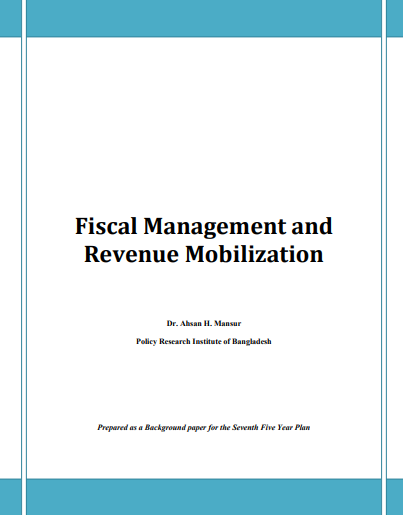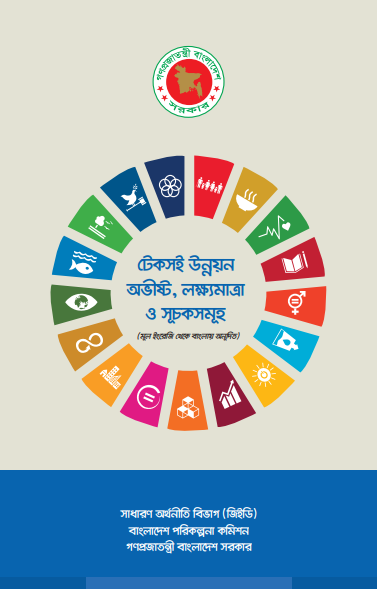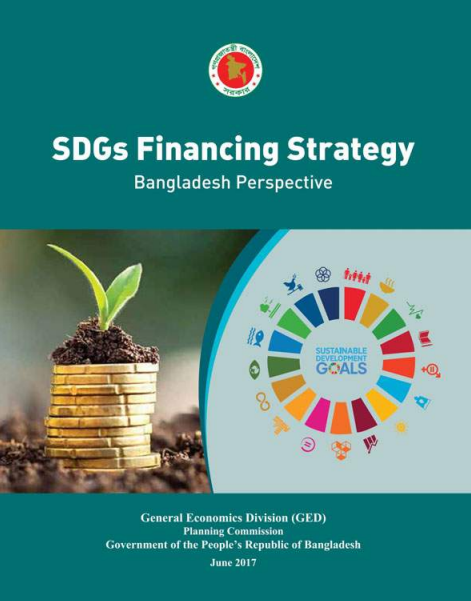Bangladesh despite being a least developed economy has had a relatively strong track record of prudent fiscal management and has made some progress in revenue mobilization efforts in the last decade. Good fiscal management in terms of keeping the fiscal deficit and public debt at sustainable levels, despite limited public sector resource mobilization, has served as the anchor to Bangladesh’s continued macroeconomic stability. The good fiscal management notwithstanding, public sector service delivery in terms of coverage and quality were seriously constrained by the limited success in resource mobilization.
Found 160 Results From

Seventh Year Plan – Strategy for Export Diversification
 February 19, 2021
February 19, 2021 Leveraging the global demand for commodities as well as services through export-oriented development should then be a strategic goal for the Bangladesh economy in its quest to achieve middle income status by 2021. Bangladesh’s export performance so far presents signs of strength as well as weakness in its export basket. Export concentration has emerged as a formidable challenge to address and overcome.
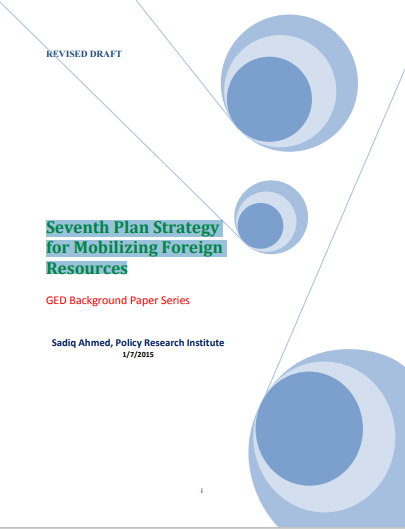
Seventh Plan Strategy for Mobilizing Foreign Resources
 February 19, 2021
February 19, 2021 Since independence Bangladesh has been experiencing a steady increase in the growth rate of real GDP, accelerating from an average of less than 4% per year during 1974-1990 to 6.4% in 2010-13 . This is a remarkable performance, even after allowing for the low initial base. Importantly, this performance is still below true potential, which gives hope that with a stronger performance Bangladesh can expect to attain middle income status by the year 2021 as envisioned in the Government’s Vision 2021 and the 20 year Perspective Plan (Government of Bangladesh, 2011a).
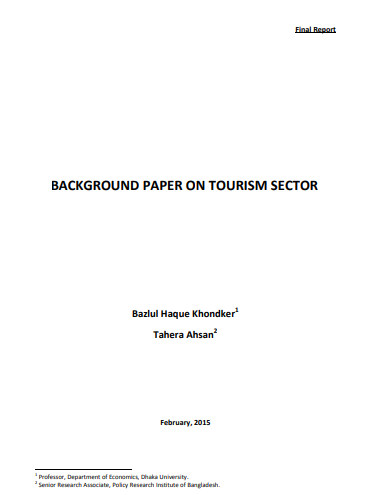
Seventh Year Plan – Background Paper On Tourism Sector
 February 19, 2021
February 19, 2021 The tourism industry has emerged as a major income-driving industry in many developing/middle-income countries in the world. There is a plethora of literature and studies that show the positive a thriving tourism sector can have positive impact on economic growth and development of countries. Bangladesh is blessed with natural beauty, ranging from mountains to rivers to beaches to bio-diversity. It boasts the longest natural beach in the world in Cox’s Bazaar as well as the largest mangrove forest in the world at the Sundarbans.
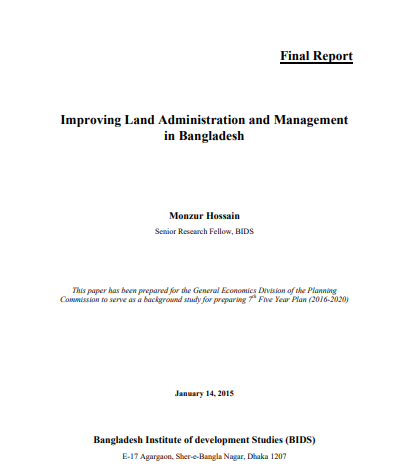
Seventh Year Plan – Improving Land Administration and Management in Bangladesh
 February 19, 2021
February 19, 2021 For efficient and appropriate land management system, maintenance of updated land ROR is very important. To address the inefficiencies involved, it is important to integrate all ownership information and allow all related agencies to share the same up-to-date information. To improve the land administration and management system, there are various solutions as suggested by stakeholders. While some of the solutions appear to be long-term by nature, some are short term. It is not possible to change the current administrative structure overnight to solve all the problems considering various difficulties involved with it. Rather, an IT solution can be sought to integrate the system and allow easy and quick fix of problems.

Seventh Year Plan Strategy for-Education and Training
 February 19, 2021
February 19, 2021 Education has multiple effects—both economic and non-economic. The well-known noneconomic effects relate to health, nutrition, and social cohesion. Better educated population has lower child poverty, lower child and maternal under-nutrition, higher female agency and empowerment. The present paper is about economic effects of education. Encouraging upward economic mobility through deliberate accumulation of educational human capital often spanned over inter-generational frame of reference--while ensuring quality education for all--is one sure time-tested way of fighting the “injustice of poverty” (Galor and Zeira 1993; Sobhan 2011).

Seventh Year Plan – Strategy for Development of SME Sector in Bangladesh
 February 19, 2021
February 19, 2021 The paper is structured in the following manner. After the introductory remarks in Section I, Section II reviews the status of the overall non-farm sector in Bangladesh based on the Economic Census 2013. Section III discusses current situation of manufacturing SME in Bangladesh based on the Survey of Manufacturing Industry (SMI) 2012.
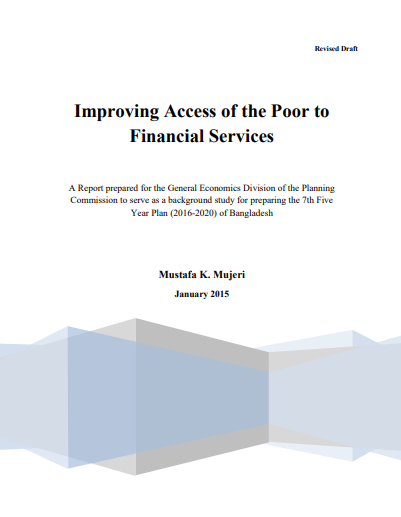
Seventh Year Plan – Improving Access of the Poor to Financial Services
 February 19, 2021
February 19, 2021 In Bangladesh, financial services are provided by a variety of financial intermediaries that are part of the country’s financial system. There are three broad types of providers of financial services—formal, quasi-formal and informal, the distinction is based primarily on whether there is a legal infrastructure that provides recourse to lenders and protection to depositors. Although the formal financial services are provided by financial institutions licensed by the government and subject to banking regulations and supervision, quasi-formal financial services are not regulated by the banking authorities. These institutions are usually licensed and supervised by other government agencies. On the other hand, informal financial services are provided by individuals and institutions outside the structure of government regulation and supervision.

SEVENTH FIVE YEAR PLAN FY2016 – FY2020
 February 19, 2021
February 19, 2021 The 7th FYP has been formulated with full recognition that the 'outlier' phenomenon is not merely a blip on the development path but rather a sustainable occurrence chartering a new development trajectory. Lauded as a 'Development Surprise' by prominent international media, Bangladesh has emerged as a shining example for countries throughout the world as it continues to defy traditional, linear development models and innovate a novel, alternative pathway for socioeconomic progress.
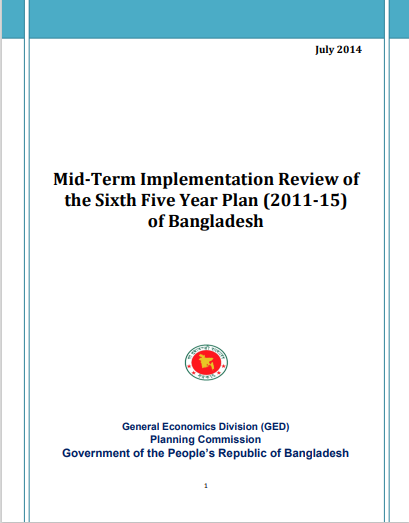
Mid-Term Implementation Review of the Sixth Five Year Plan (2011-15) of Bangladesh
 February 19, 2021
February 19, 2021 For the first time in the history of economic planning in Bangladesh, the Sixth Five Year Plan introduced the concept of results-based monitoring and evaluation (RBME). This was done to be consistent with the spirit of indicative planning whereby the Sixth Plan was conceived as a living document that would be monitored for results, and changed and adapted in light of these outcomes and changing global and domestic economic environment.

First Implementation Review of the Sixth Five Year Plan
 February 19, 2021
February 19, 2021 The Sixth Five Year Plan (2011-2015) seeks to accelerate growth and reduce poverty. With the completion of the second year of the Plan, the Government believes it is important to evaluate the implementation progress with a view to understanding how well the Plan is being implemented, what policies are working, what are the emerging constraints, and what needs to be done to make mid-course corrections.

SIXTH FIVE YEAR PLAN – FY2011-FY2015
 February 19, 2021
February 19, 2021 Over the past 40 y¬ears since independence, Bangladesh has increased its real per capita income by more than 130 percent, cut poverty by more than half, and is well set to achieve most of the Millennium Development Goals. Bangladesh’s development experience is particularly remarkable in that it stands out as a positive example of a resilient young nation that has fought many natural and global disasters as well as internal political debacles and yet stayed firm on the development path. Notwithstanding many external and internal shocks, per capita income has risen continuously and steady progress has been made in lowering poverty. This positive development experience provides the basis for optimism, notwithstanding the many remaining policy and institutional constraints and the global uncertainties, that Bangladesh will continue to make inroads in improving the living standards of its citizens.

Fifth Five Year Plan
 February 19, 2021
February 19, 2021 The Fifth Five Year Plan (1997-2002) has been formulated with a vision as a guide. The dream of the Father of the Nation Bangabandhu Sheikh Mujibur Rahman of Sonar Bangla from where poverty and deprivation will be banished forever has served as a beacon to the plan formulators. For too long this dream has remained unrealised. Adverse international situation affected our efforts to take a place of pride in the comity of nations. The brutal assassination of the Father of the Nation in 1975 took the nation away from the charted course of attaining prosperity in freedom. Our steps faltered. We continued along the trend lines. We did not yield ratchet effects through conscious, dispassionate and determined endeavour.
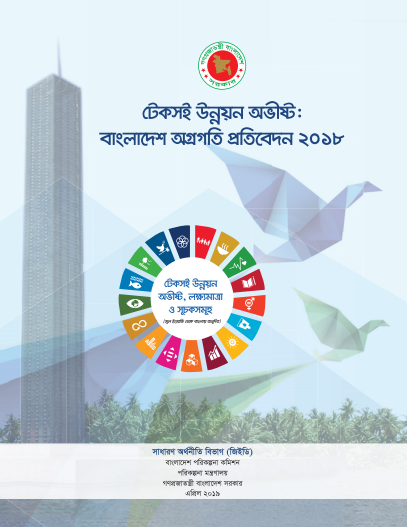
SDGs Progress Report Bangla 2018
 February 19, 2021
February 19, 2021 বাংলাদেশে টেকসই উন্নয়ন অভীষ্ট (এসডিজি) বাস্তবায়নের মূল্যায়ন প্রতিবেদন তৈরিতে একটি পদ্ধতিগত নির্মাণ কাঠামো অনুসরণ করা হয়েছে। এর মধ্যে আছে বাংলাদেশ পরিকল্পনা কমিশনের সাধারণ অর্থনীতি বিভাগ কর্তৃক প্রস্তুতকৃত এসডিজি সম্পর্কিত প্রতিবেদনগুলো এবং সপ্তম পঞ্চবার্ষিক পরিকল্পনা দলিল পুঙ্খানুপুঙ্খ বুঝতে পারা। এই কাজটি করতে গিয়ে বিভিন্ন সংগঠন যথা: বাংলাদেশ পরিসংখ্যান ব্যুরো, জাতীয় পরিসংখ্যান প্রতিষ্ঠান এবং বিভিন্ন মন্ত্রণালয়/বিভাগ থেকে এসডিজির সূচকগুলোর ওপর তথ্য সংগ্রহের জন্য পর্যাপ্ত প্রচেষ্টা নেয়া হয়েছে। তাছাড়া, তথ্য-ঘাটতি দূরীকরণে আন্তর্জাতিক উৎস যথা বিশ্বব্যাংক, জাতিসংঘ এবং ওইসিডির সাহায্যও গ্রহণ করা হয়েছে।
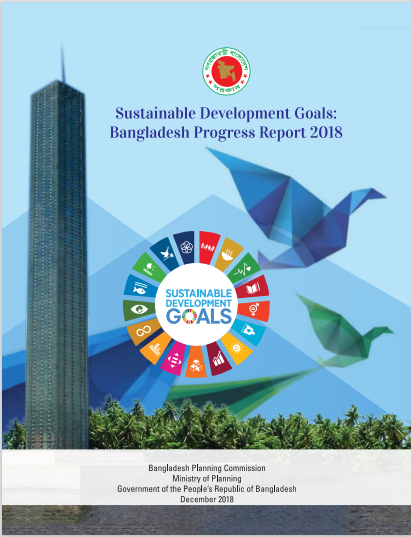
SDG Progress Report 2018.ai English-compressed
 February 19, 2021
February 19, 2021 The progress report on SDGs implementation in Bangladesh has been prepared following a methodological framework. This involves a thorough understanding of the 7th Five Year Plan document, and the documents related to SDGs prepared by General Economics Division of the Bangladesh Planning Commission. Significant efforts were made to gather data on the indicators from Bangladesh Bureau of Statistics, the National Statistical Organisation, and other concerned Ministries/Divisions. Data and information have been also collected from international sources such as the World Bank, the UN and the OECD to fill the data gap.

